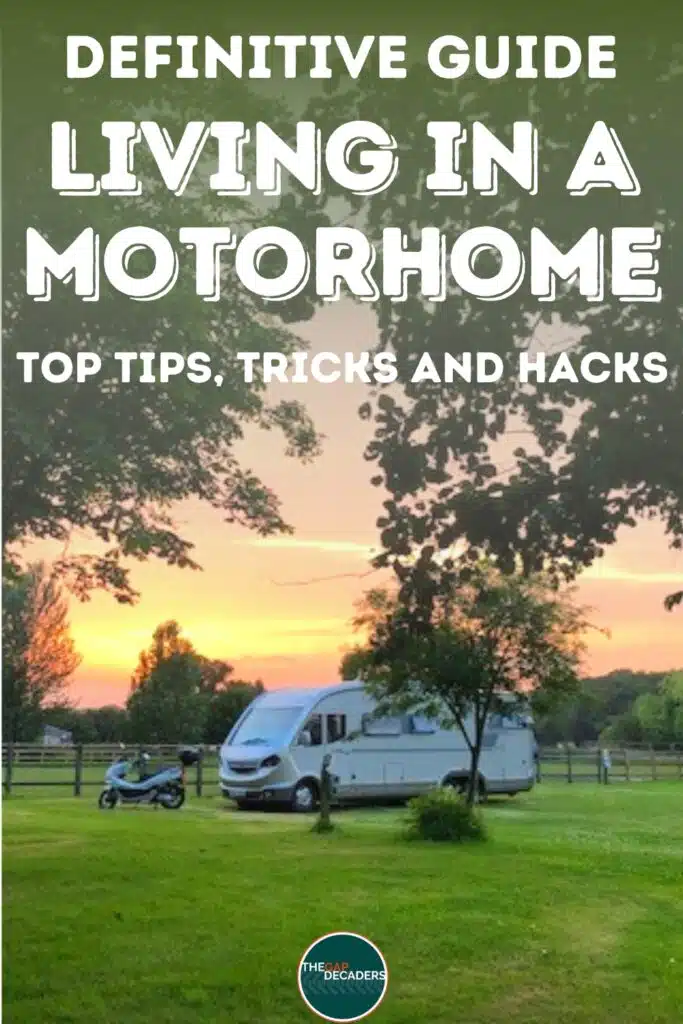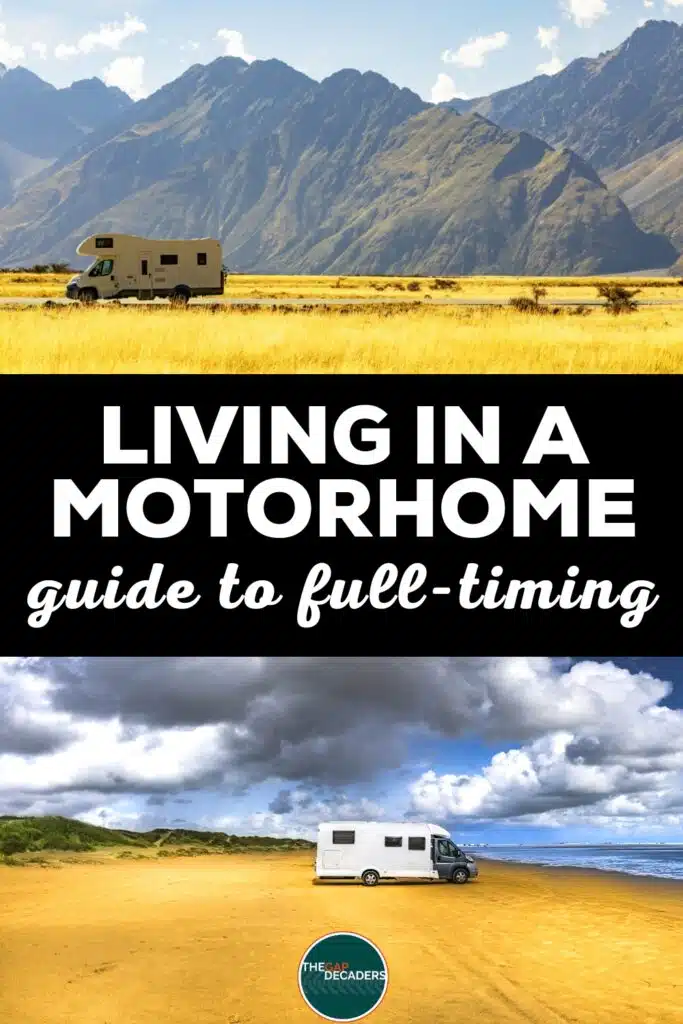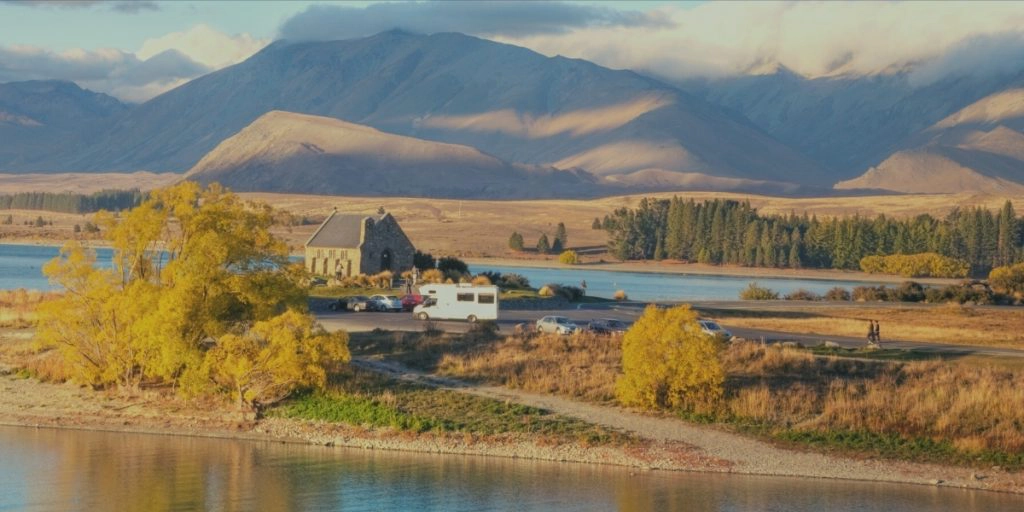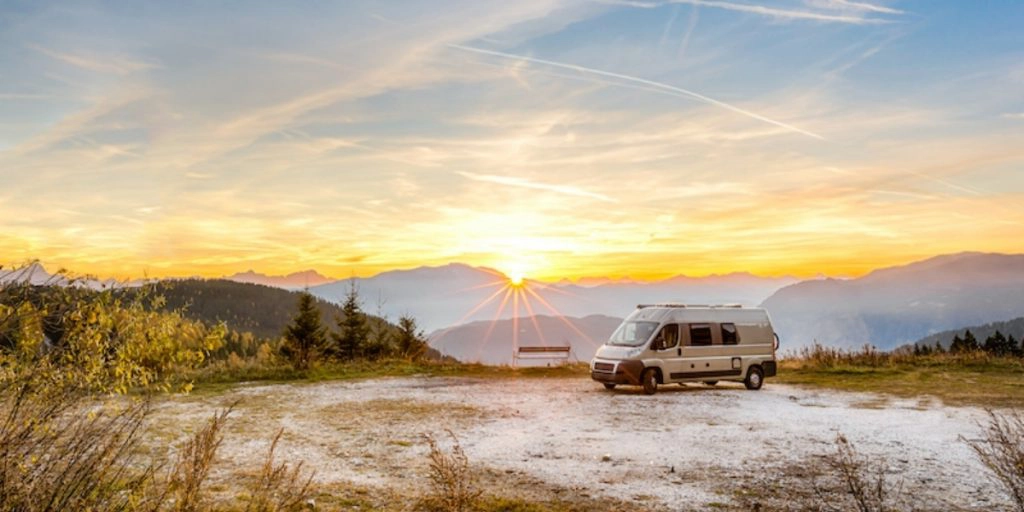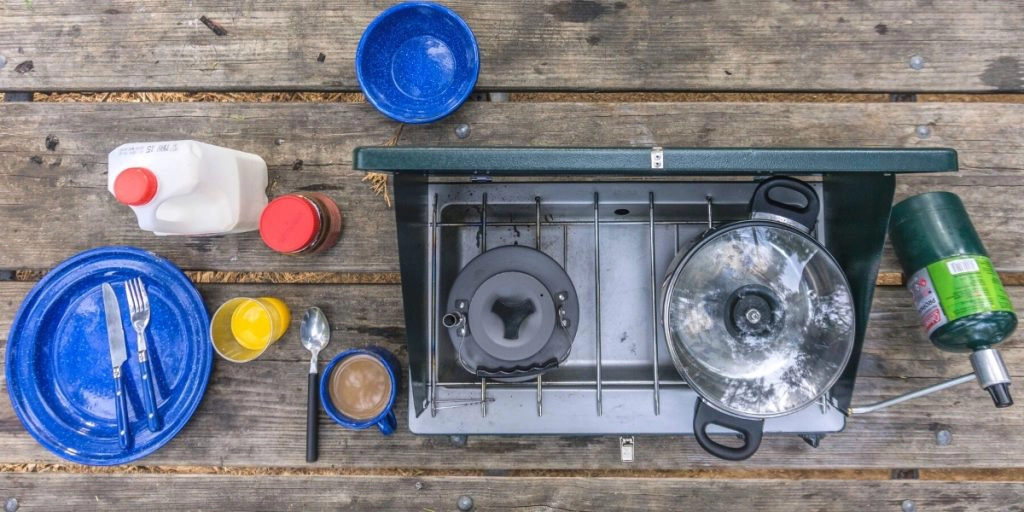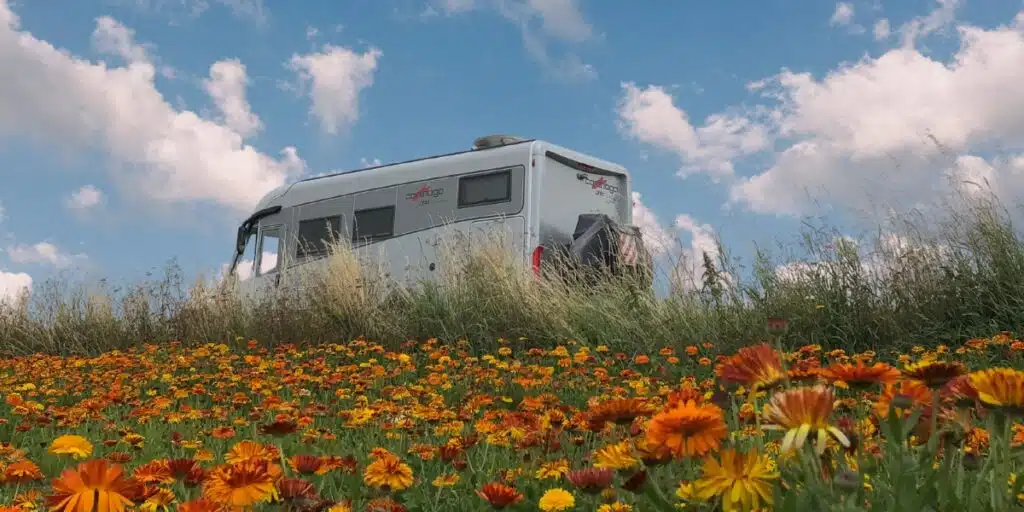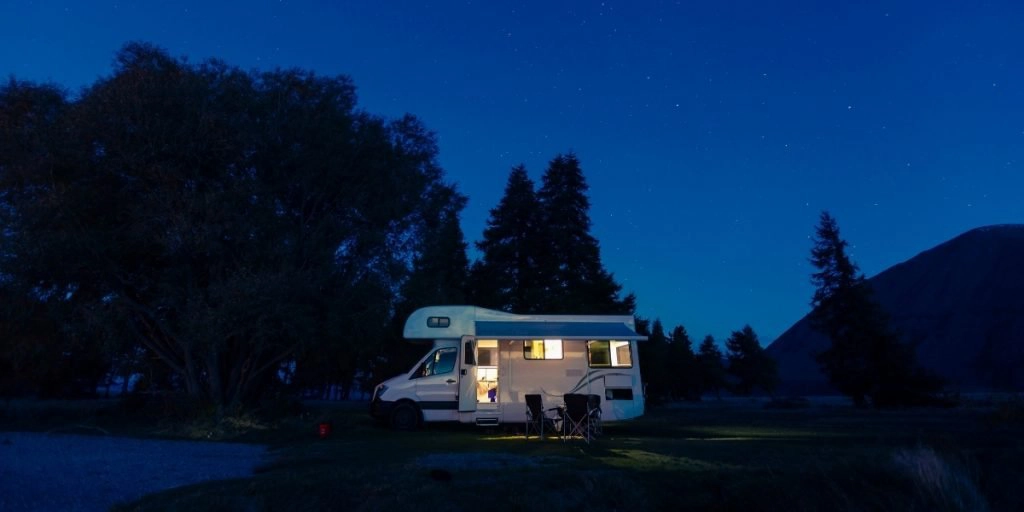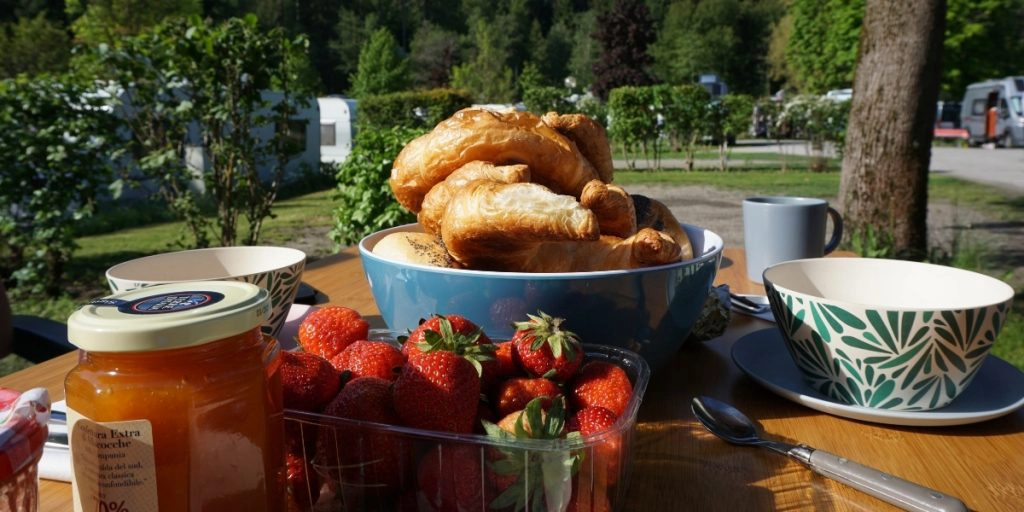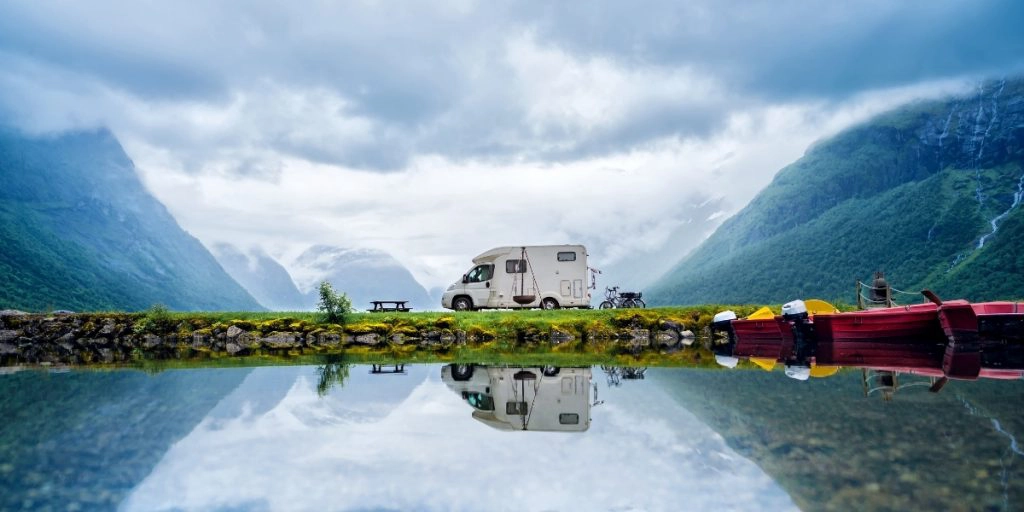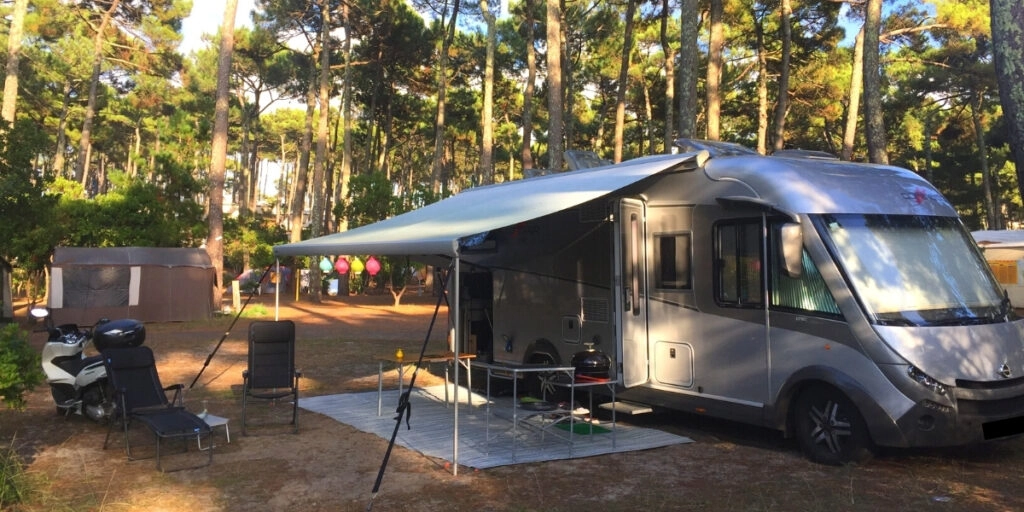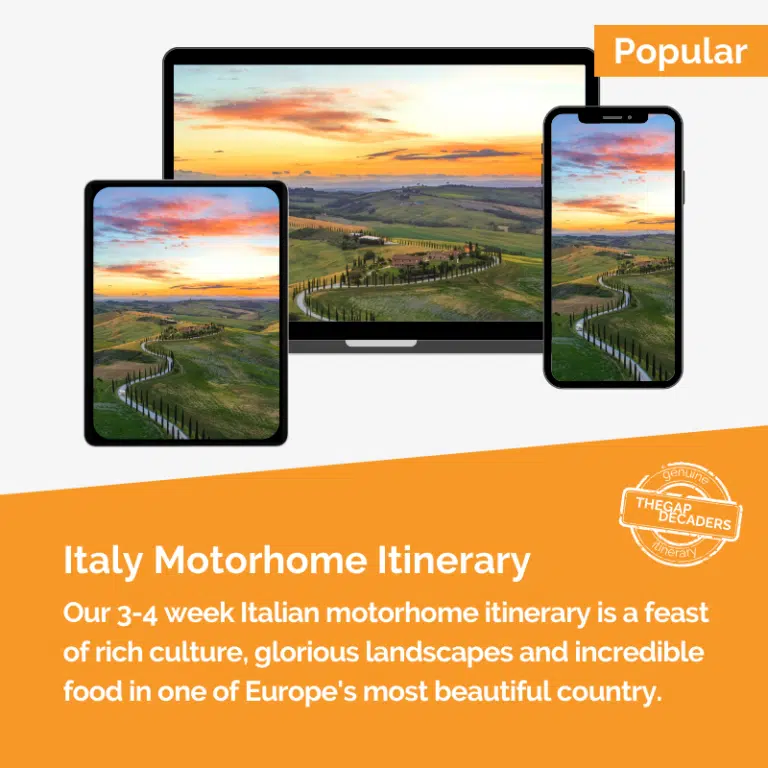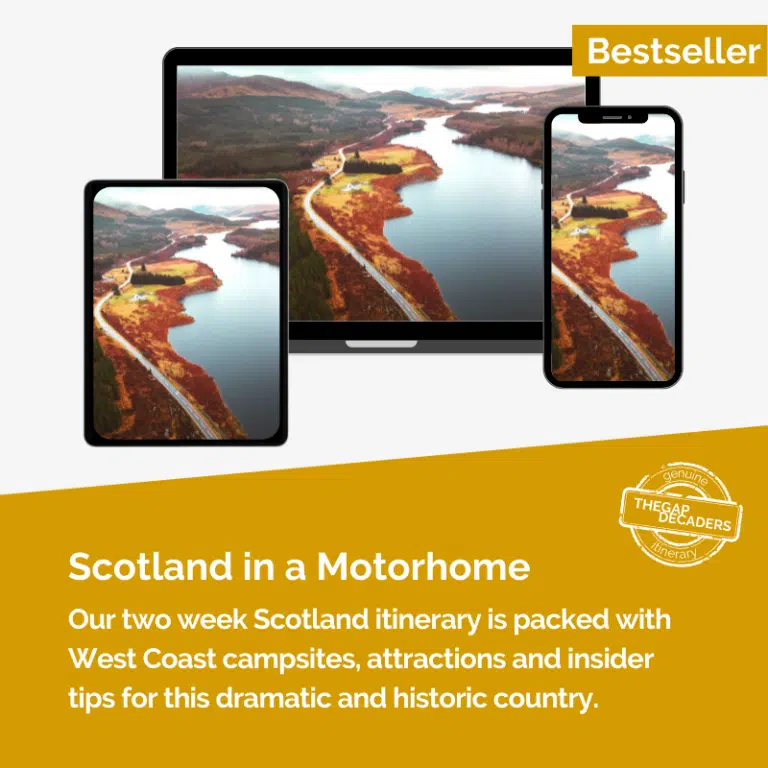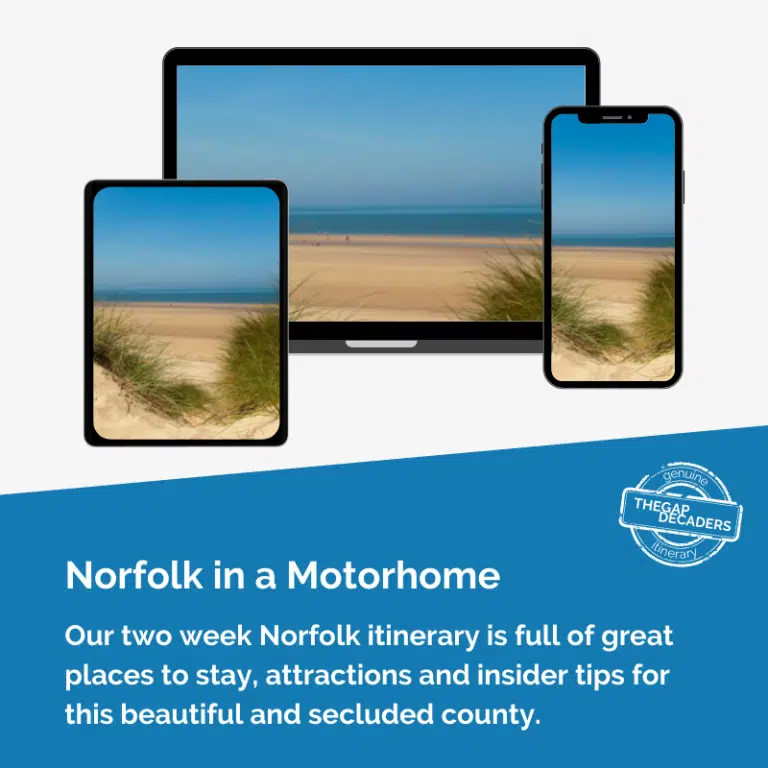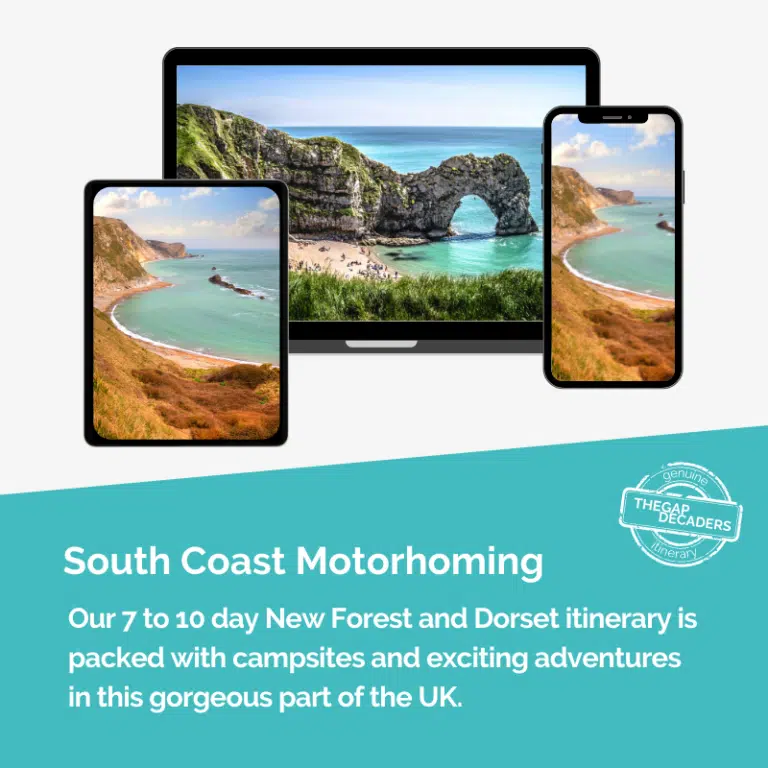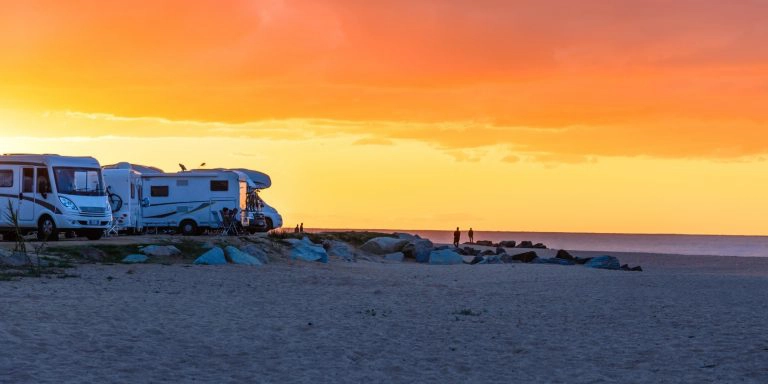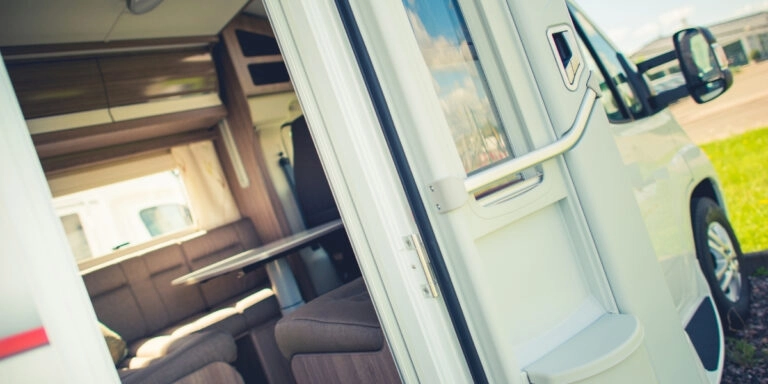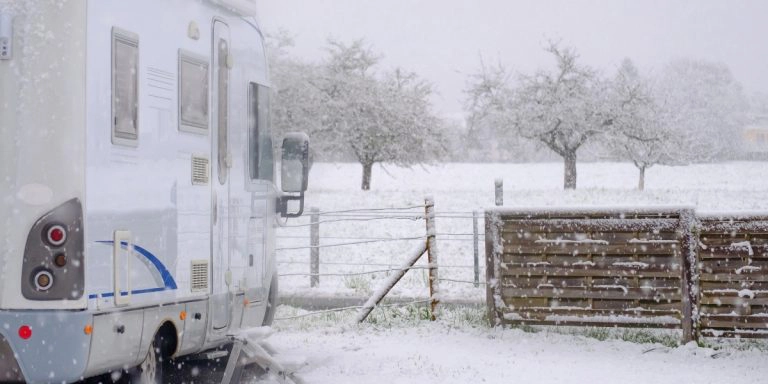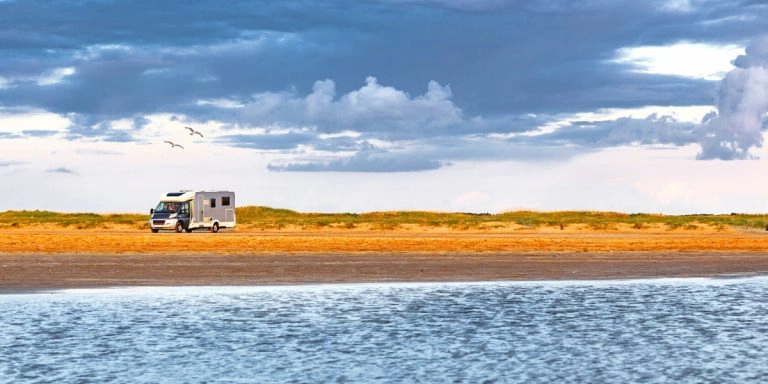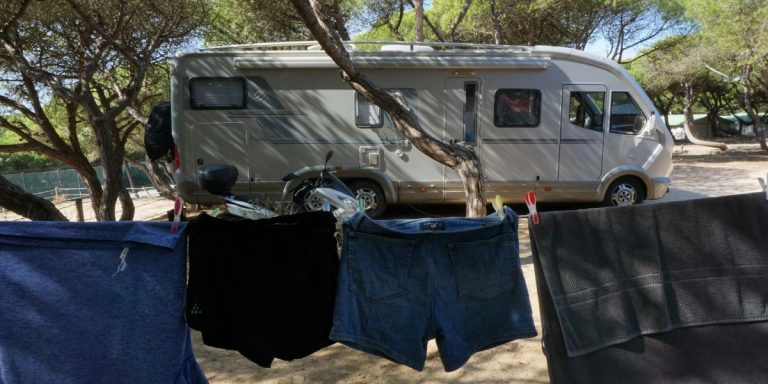This post may contain affiliate links, from which we earn an income. Click here to read our affiliate policy.
The definitive guide to motorhome life
Are you gearing up for a gap year on the road, or are you ready to take the leap and embrace full-time motorhome living? Whether you’re chasing adventure or simplifying life, making the switch is an exciting move! But before you head off into the sunset, let’s talk about what it’s really like to living full time in a motorhome – no sugarcoating, just real insights and expert tips to help you thrive.
We’re Phil & Izzy, full-time motorhomers for over five years. In 2018, we sold our house, let go of most of our belongings, and hit the road in search of something different. Since then, we’ve travelled across Europe and beyond, clocking over 100,000 miles, living in two motorhomes and now an overland truck. Through it all, we’ve learned a thing or two about making this lifestyle work – without losing our sanity!
In our ultimate guide to living in a motorhome fulltime, we’ll take you through everything you need to know – from planning your move to the nitty-gritty of daily life on the road. We’ll cover essential tips for staying safe, healthy, and happy in your tiny home on wheels, plus practical advice to help you make this lifestyle last. Ready to turn the dream into reality? Let’s go!
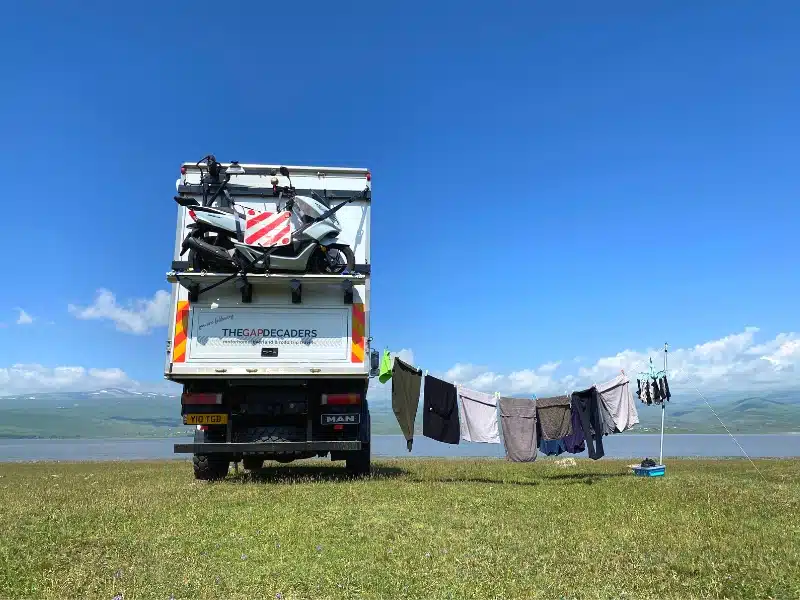
Planning to Live in a Motorhome
Successful full time motorhome living is mostly about preparation and that dirty word – compromise! If you are thinking about giving it all up for a life of motorhome travel, ask yourself these seven questions;
1. Does the motorhome or campervan offer what you need?
If you already own a motor home or camper van is it realistically big enough in which to live full time? 24/7 for 365 days of the year? How would you manage if one of you got ill and your living area was also your bed? What about being stuck inside when it gets dark at 4pm or it’s raining for days on end? Can you live in a motorhome in the winter when it’s cold and miserable?
These are such simple things to manage when you live in a house, but living in a motorhome full time is different. You’re in a small space where you feel the changes in the seasons and elements way more, whether you’re travelling in a motorhome in the United Kingdom, Europe or some far-flung place like New Zealand!
Is your home on wheels fit for purpose? Do you want a left-hand drive van if you plan to chase the sun in Europe? Does the bed work for your needs – making one up every night gets a bit tedious after a while, and those types of beds are really uncomfortable in the long term.
2. Who are you travelling with?
Can you live in a camper with your other half, in a confined space full time? Or manage alone if you are a solo traveller? What about travelling as a family with kids? How does it work if you’re planning on travelling with a dog?
If you’re used to going your separate ways to work every weekday and enjoying the weekends together, travelling as a couple without much personal space can be challenging. Make sure you’re not looking at this aspect of van life through rose-tinted specs.
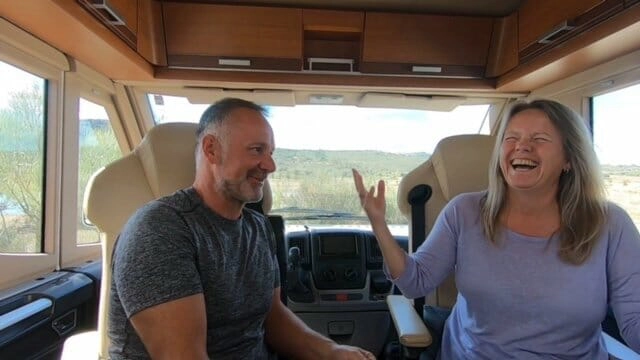
3. Are you willing to compromise?
You may have to give up a lot to achieve your dream of permanent motorhome living. We sold our house and almost all of our possessions, and other full-timers we know have rented their property. A good question to ask is whether you think you can do without all the trappings of your previous life in a traditional home.
Unless you’re willing to fork out huge sums of money (and OMG it is expensive!) on storing your stuff, then you will probably be looking at selling everything.
For us, the campervan lifestyle and the ability to travel where and when we want is worth far more than any clothes, cars or possessions could be, but not everyone feels the same.
4. Are you chasing the dream or running away?
Do you want to live in a camper van or motorhome for the right reasons? Really dig deep and ask yourself and each other whether you are running away from real life – work, family issues, money problems or whatever else is happening in your world.
We were looking for a different way of life, but with five years of hindsight, we can also see that we were escaping jobs we had fallen out of love with and a lifestyle we didn’t enjoy. Find out more in our story, where we share the decisions we made and why.
Motorhome living is unlikely to solve any of those issues and may magnify some of them.
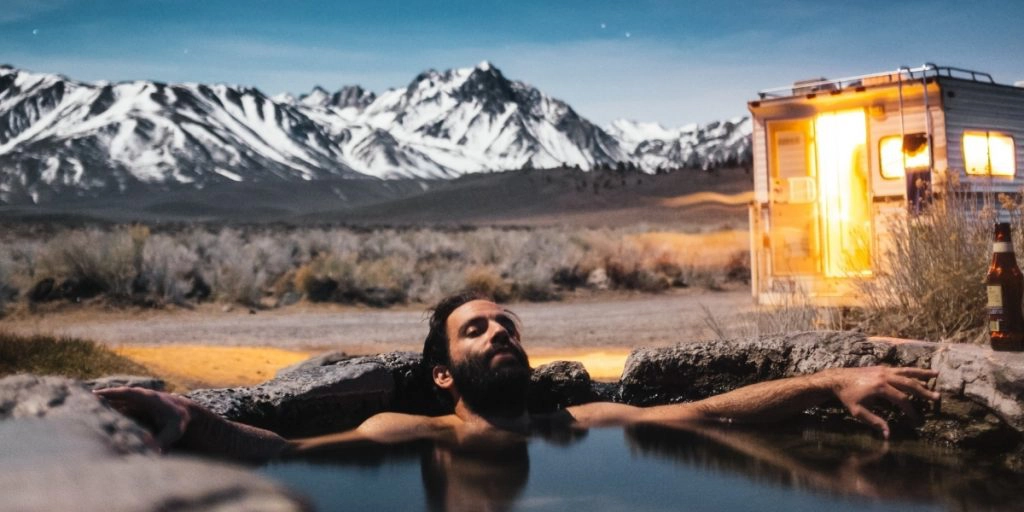
5. What’s your goal?
What do you want to achieve from living in a motorhome? You could tour Europe in your motorhome without a plan but will get so much more from your experience if you understand the why.
For us, it was about wanting to do something different with our lives and escape the hamster wheel of ‘normal.’ We wanted to feel excited and look forward, rather than waking up with a heavy heart to another day, Groundhog Day.
If you don’t want to make the move permanently or want to try it out first, an adult gap year is the perfect way to explore whether living in a motorhome is right for you. Rent out your house and take a sabbatical if you can, before dipping a the in the motorhoming water.
6. How are you paying for it?
Will you have enough money to finance your motorhome life? It will always cost more than you think, but living in a motorhome is still much cheaper than living in a house. Our post about costs, money-saving tips and hacks for touring in a motorhome will help you work out a budget.
Living in a motorhome permanently in the UK will be more expensive than in Europe due to the cost of campsites, lack of aires, and easy wild camping and off-grid parking.
You may also have to pay to use services which are generally free or very cheap in Europe. Some of this will be offset by cheaper motorhome insurance and not needing travel insurance if you don’t intend to travel outside of the UK.
More and more people are choosing to live full-time in motorhomes and vans, often working remotely as digital nomads as they travel or stay in an area and go to work daily.
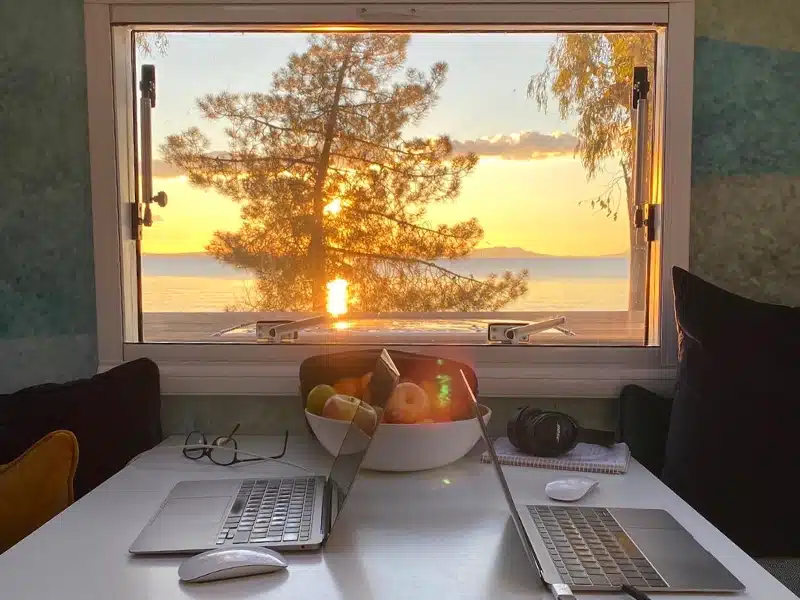
7. What about family & friends?
Are you happy to be away from family members and friends back home? Can you accept that they may not all be delighted for you, a sad reality of following your dreams? The bonus is, as you meet other van lifers, you’ll make a load more new friends who get you and your way of life.
Can you live with paying €1.29 for a good bottle of wine? Oh…wrong post…….
If you’re cool with all that, then what follows in this guide will help you understand the finer details of full-timing and how to live in your new home. We’ll share with you how to survive it and how to have the best time of your life doing it!

Get our best-selling ebook bundle for all you need to know about living in a motorhome!
Top Tips for Living in a Motorhome
Best Motorhome for Full-Time Living
I don’t think there really is a single make and model of motorhome that is better than others if you want to live in it permanently. So much depends on your plans and how you want to live in your motorhome.
Generally, motorhomes are not designed to be lived in permanently, so we would say that anything that’s poorly made or a bit flimsy will suffer.
If this is going to be your home for the next however many years, then look to the German or French brands for build quality and longevity. If your budget is tight, older models with a few miles are worth considering and probably a better buy than new British-manufactured motorhomes.
We had a 14-year-old Knaus for several years, which was built like a tank and just kept going!
If you’re going for a van conversion, then make sure you fully understand how it’s been built, especially if it’s a self-build. Are you confident in the skills of the builder and the equipment used? The last thing you need is to head off on the road full-time in a shoddy build, with problems that your lifestyle will exacerbate.
RELATED POST: Buying a Motorhome That’s Right for You – All You Need to Know
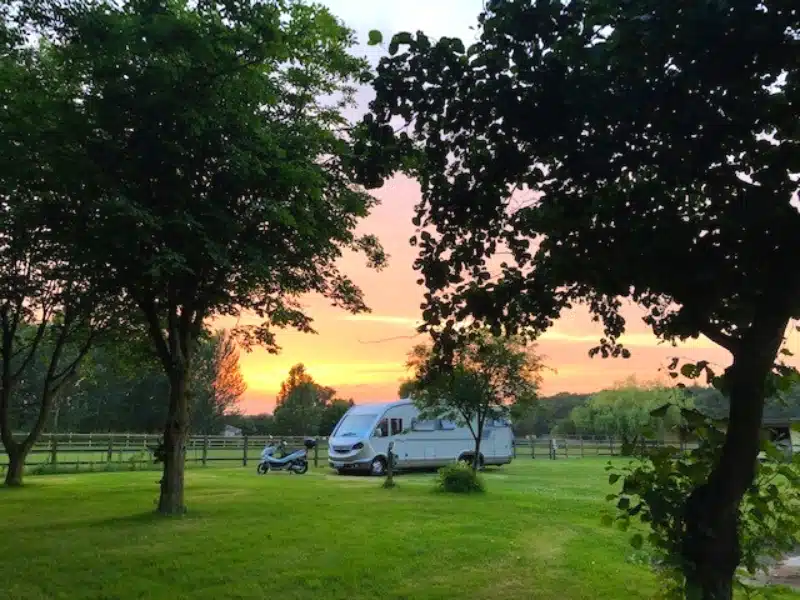
Rules for Living in a Motorhome
Can you live in a motorhome full-time in the UK and Europe? Many people contact us to ask questions about the legalities of full-time campervan living. So, is it legal to live in a van?
There is no specific law preventing you from full-time motorhome living in the UK or Europe, as long as you follow the specific vehicle and residency laws of the country in which you are living or travelling.
Living in a Motorhome Full Time in the UK
According to Expost, over half a million people in the UK live full-time in motorhomes, static caravans and tourers.
To live in a motorhome in the UK you need to be a resident, with a British passport or other entitlement to live there. Your motorhome or campervan must be taxed, insured and have a valid MOT.
You must also follow the correct rules regarding where you park or stay in your motorhome, whether that’s on permanent motorhome sites, wild camping in remote areas or using parking lots for free.
Living in a Motorhome Full Time in Europe
In Europe, living in a camper van has become a bit more complex now that Great Britain and Northern Ireland have left the EU. Travelling in Europe has become more complicated because of changes to freedom of movement for United Kingdom citizens in Europe.
Travelling full-time on the continent is still possible, but you can now only spend 90 in every 180 days in the Schengen area. This means leaving European countries we are familiar with and heading for Morocco, some of the Balkan countries, and Turkey.
Motorhome Insurance
The type of insurance you need will depend on where you want to travel and your circumstances. Safeguard, Sterling, Staveley Head and Comfort all over 365 days policies for Europe, which covers all the member states of the European Union. Since 2021, a green card is no longer required, but you must have a minimum of 3rd party insurance.
You will need separate cover to visit places like Morocco, Turkey and some of the non-EU Balkan countries. If you’re lucky, your insurance company may cover you, although this is becoming rare now. Otherwise, you need to buy third-party insurance at the border.
Full-Timing Motorhome Insurance
If you rent or sell up your property to live in a motorhome and don’t have a brick-and-mortar base to return to, you’ll need to take out full-timing insurance.
This is generally more expensive than regular insurance, and you may be tempted not to tell the insurance about your circumstances. However, this could invalidate your insurance if you have an accident.
Only one true full-time policy is available in the UK, which is underwritten by Aviva and sold by the brokers Comfort Insurance and Adrian Flux. Other insurers like Safeguard offer 365 days of EU travel as standard, but they do this because you have a home to return to. This is the point of difference between full-timing in a motorhome and travelling in a motorhome.
Breakdown Insurance
It’s not necessary by any means, but if you’re heading to Europe or in an older motorhome, having a motorhome breakdown cover gives you peace of mind.
We use RAC Arrival, which is offered in conjunction with The Camping and Caravanning Club. If you’re not a member, the RAC often do deals where membership is included in the price.
Choose their motorhome breakdown cover with no height, weight or length restrictions. As far as we know, it’s the only product with no restrictions on the market.
Travel Insurance
You will also need travel insurance to supplement your EHIC or GHIC health insurance card if you intend on living in a motorhome in Europe or beyond. We’ve had several health scares, and the GHIC has worked a treat each time. Get one here if you don’t have one – they’re free for all UK citizens.
Back-packer insurance tends to be the best as it will cover you for up to 24 months, although lots of companies limit you to a year if you’re over 55 years old.
Most companies won’t let you take this out once you’ve started travelling, so plan ahead. If you use True Traveller, who we recommend, they have a backpacker policy that you can renew annually while on the road. This policy also has excellent activities covered as standard and allows you to pick the insurance elements you want to be covered. So if you don’t want baggage or cancellation cover, you don’t pay for it.
Home Insurance
If you don’t sell or rent your property, you may find your buildings and contents cover limits your home being unoccupied to 30 days. Some insurers offer unoccupied house insurance but this inevitably is a bit more expensive.
Talk to your existing insurer to see what they will cover. You could arrange for a regular person to check the property or even put a security contract in place. It’s worth shopping around for the best policy.
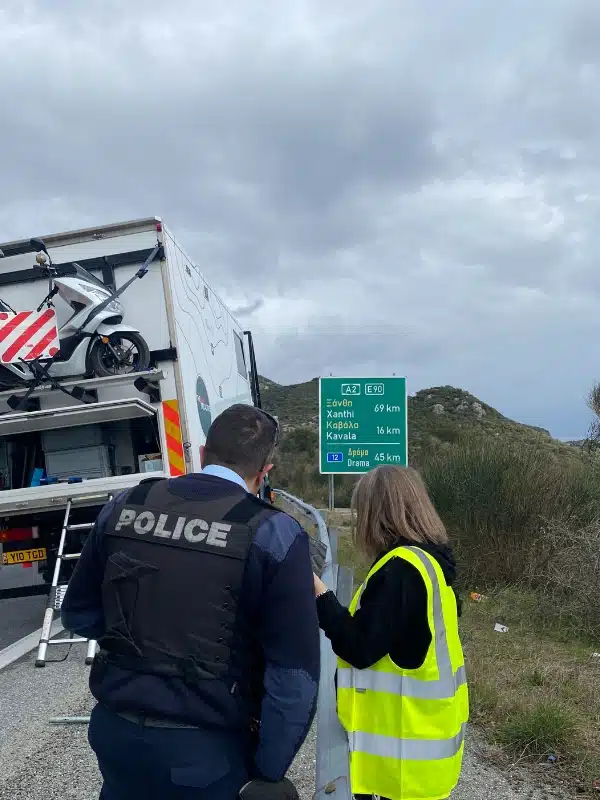
Managing Your Address
What address will you use if you’re selling up or renting? You will need a UK fixed address for your driving licence and V5 document, which will also need to be used for motorhome insurance. Think carefully about where this might be, as some parts of the country will increase your premium exponentially due to high-risk factors.
Many full-timers, us included, use a family member’s address for DVLA, insurance and banks which helps maintain a credit footprint in the UK. You could also be added to the electoral roll at that address – you don’t need to actually live there.
We maintain a permanent address at my Mum’s house. We literally changed our address for everything when we sold the house. We are also on the electoral role at Mums, but after the first year of paying the 25% council tax single-person discount my Mum had previously received, we told the council we were no longer living there and she now only pays for herself.
You can ‘rent’ an address for most things, but the DVLA will not usually accept virtual, correspondence, PO Box or commercial addresses, which makes registering your vehicle difficult.
This is what the DVLA say; “We do recognise that there will be occasions where individuals cannot provide a postal address at which they reside and, in certain circumstances, we do allow an alternative address to be used. However, because of the potential risks, we will only agree to such arrangements on a case-by-case basis and we expect a robust reason and evidence that compels a driver to use such an address.”
Expost offers a fixed residential address with mail forwarding, which, they say, will be accepted by DVLA for vehicle registration. We haven’t tested this, but if you do and it works, please let us know 🙂
Access to Healthcare
This can be a challenging issue, especially if you’re a more mature motorhomer like us 😉 Real-world problems can take us by surprise – think Covid – and it’s certainly made us think about managing healthcare and medical issues.
You might find that once you’ve moved away from your home address, your GP surgery takes you off their list. We are registered with the GP surgery, which covers my Mum’s address, and we can now have virtual appointments with the doctor, but getting routine healthcare like smears and mammograms is not easy.
If you have a long-term condition and require regular medication, your GP may only be willing to prescribe three months at a time, which could leave you without medication in Europe.
Many countries in Europe and beyond will sell you the medication from a pharmacy if you take the box with your details and a passport. In some EU countries, like Italy, you can get antibiotics over the counter without seeing a GP.
You could take out European-wide private healthcare. Bupa, Axa and Allianz all offer international private health insurance, but we found the costs to be unaffordable. I imagine it would be even more expensive for those with pre-existing conditions.
A reasonably new offer which we started seeing in 2024 is digital nomad insurance. This insurance is not designed to cover cancellations, baggage loss or curtailment-type issues; it is purely to cover medical and repatriation expenses and is much more affordable than private health insurance. Safety Wing and Genki both offer this type of insurance, for which you pay a monthly fee with no contract.
Motorhome Accessories & Equipment
Living full-time in a campervan will inevitably result in a process of elimination as you downsize; what do you want, and what do you really, really need?
Motorhome and campervan storage is always a challenge for long-term travellers because of limited space and vehicle weight constraints, and downsizing from a house to a motorhome was, for us, one of the most challenging parts of the process.
We had six lists: keep and take, keep and store, give to charity, sell on eBay, throw away and give to family. The logistics of doing this while selling a property, sourcing the right motorhome and working out the order of events was more stressful than I want to remember.
How much you keep to take with you will, of course, depend on the size of your van and payload, and what is important to you. If you like cooking, then food storage will be a priority. If you’re a YouTuber, then gadgets and gear will take up room.
Fitted Accessories
If you’re living long-term in your motorhome, you’ll likely want accessories fitted which make life easier on the road. This could be solar panels to generate electricity so you don’t always have to stay on a campsite or refillable gas bottles to save money and the hassle of finding replacement bottles.
We took out the Thetford toilet and cassette we inherited with the truck and fitted a compost toilet, which means we no longer have the grind of finding a chemical disposal point every few days.
Fitting motorhome WiFi systems, swapping to lithium batteries for more power and longevity and adding diesel space heaters are all popular options with full-timers that help make motorhome life comfortable and more cost-effective.
How Does a Motorhome Work?
Get our free and easy guides to all things related to motorhome systems. Don’t head off into the sunset without a clue; find out how your motorhome works and understand how all the systems fit together first!
Personal Kit
If, like us, you want an inflatable kayak, two inflatable paddle boards, kite-surfing gear, two bicycles and a portable washing machine, it’s fair to assume that some difficult decisions about everything else might need to be taken!
Clever motorhome storage options help you fit more in and be innovative about using your limited storage space. If you can be organised about where things are, this will also help. This will evolve as you are on the road and learn what works for you. What’s important on day one will have changed by day 60!
We bought all of our storage boxes and packing cubes from Ikea, from rigid plastic stacking boxes for the garage and under the bed to soft felt boxes for the overhead bins. Ikea storage is innovative and well priced, and all of ours is still going strong five years later!
At the end of our first year of campervan life, we had the van serviced, and there was a weighbridge right next door. Out of curiosity, we ambled over and got weighed …oops! We were half a ton over our maximum allowed weight of 4,500kg, and that was with an empty freshwater tank!
So, we had a massive sort-out and were a bit stunned to realise we had been carrying around half a tonne of stuff that we had never used! Our rule now is that if it isn’t used in a couple of months, it doesn’t stay.
Getting About
You will also want to consider how you will get about on a day-to-day basis. If you plan to mostly free or wild camp, then you will probably be moving on regularly, but if you intend to stay on sites and visit cities, you will need some form of transportation other than your motorhome.
This could be a tow car, a scooter or motorbike, e-bikes, e-scooters (legal in many EU countries) or good old-fashioned pedal cycles. Weight, space and cost will be massive factors here but it is an important aspect of living in a motorhome.
We know people who rely solely on public transport, but I’ve always felt trapped by that idea. Being stuck on a site without the means to get to the nearest village for a pint of milk or a bar of chocolate is not much fun!
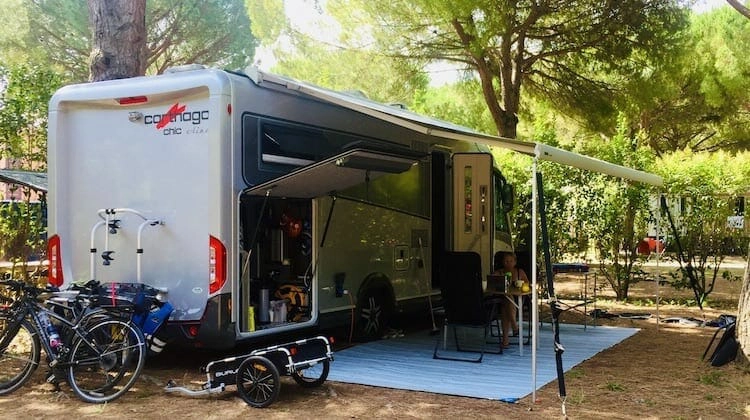
Helpful Motorhome Guides
Living Motorhome Life!
So you’re actually doing it! You’re on the road, full time living in a motorhome. For some people, it’s an easy transition, less so for others.
We spent the first two weeks of van life euphoric as we headed south to the sun, the third week wondering what the hell we had done, and the following six months loving every moment. Most people who live full-time motorhome life tell us they went through a similar process.
After about six months, we took a nose-dive; the clocks changed and the weather changed too, in the space of one day. We became a little desponded and struggled to adapt. We were also a little travel fatigued (yep, it’s a thing) after seeing so many new places and having so many new experiences; we missed being in one place.
But we bounced back and accepted that not every day will be perfect, life is life after all …we’re just living it slightly alternatively!
We All Need Purpose
It would be easy to sink into a life of motorhome slobbery (and you may want to, and that’s fine), but for us, it just wouldn’t work.
We spent the first six months revelling in not having to get up for work or clean the motorhome (if we didn’t want to), but eventually, our body clocks kicked in, and now we are up at around 8am most days, and often earlier on travel days.
We have found purpose by setting up and running The Gap Decaders motorhome blog and website, and YouTube channel, but there are lots of other ways you can fill your time.
Try house-sitting or pet-sitting or volunteering with WorkAway. If you’re a keen photographer, sell your images through Pexels or Unsplash and earn a bit of dosh.
Perhaps learn a language or take up a new sport; Phil has learnt to kite-surf, and we have both been trying to learn Spanish as we have enjoyed living in our motorhome in Spain so much.
Travelling in a Motorhome
For many, travelling and experiencing new countries, cultures, and landscapes is purpose enough and the reason for choosing to live in a motorhome in the first place.
Deciding where to go can be tough, but luckily, we’ve done all that exploring and can share the best destinations and wild camping spots with you!
We have country-specific motorhome touring guides and motorhome itineraries to help you plan your trip. Once you’ve got going, you’ll work all that out yourselves, but lots of our readers really appreciate a helping hand in the first few months.
Community
One of the most unexpected joys of motorhome life is the community of fellow travellers. At campsites, popular overnight spots and aires, we meet people from all walks of life – retirees, young digital nomads working remotely, and families taking a break from conventional life.
The shared stories and like-minded outlooks create a deep sense of connection which we didn’t find in our conventional bricks-and-mortar life. We pick up tips on the best scenic routes and off-grid camping spots, learn clever motorhoming tricks, and sometimes travel together for parts of the the journey.
Staying Connected
Connectivity is also really important. We thought we would do away with mobiles and become virtuous hippies, but the reality is we use our devices and the internet to research, watch TV, map, stay in touch and blog.
Email and social media are lifelines for keeping in touch with friends and family. How did we ever think we would manage without such an epic and permanent road trip?
There are many, many ways to get WiFi and internet in your motorhome, including buying local SIM cards if you’re abroad and using your phone as a hotspot router.
Cooking
One of our pleasures on the road is cooking, and we enjoy having time to be creative and try new foods. It can be challenging cooking in a motorhome, so we use a Cadac grill outside whenever the weather allows, especially when we’re cooking meat or fish.
I can’t deny that we put weight on in the first few years. All those croissants and cheap wine played havoc with our waistlines, and it took a while to lose the being on holiday feeling. Now, we are more restrained and try to walk every day, although we still love Europe’s cheap wine!
What Would We Do Differently?
We have no regrets about choosing this lifestyle but there are some things we would maybe do differently.
We both wish we could have kept our house. At the time of deciding to travel, it didn’t feel like there was an option. But, with hindsight, we could have taken longer to plan and maybe found a way to live in a motorhome and keep the house.
I think, for us, living in a motorhome works because we are also using it as a means to travel. If we were living in the UK and working in a physical job, the lifestyle would not have the allure it does when we can move around.
For us, it’s a way to explore, see, absorb and expand our minds and meet new people, one of the highlights of the past five years.
Along with all the ups and downs of this slightly crazy and alternative lifestyle choice, we are grateful every day for our life and know we made the right choice.
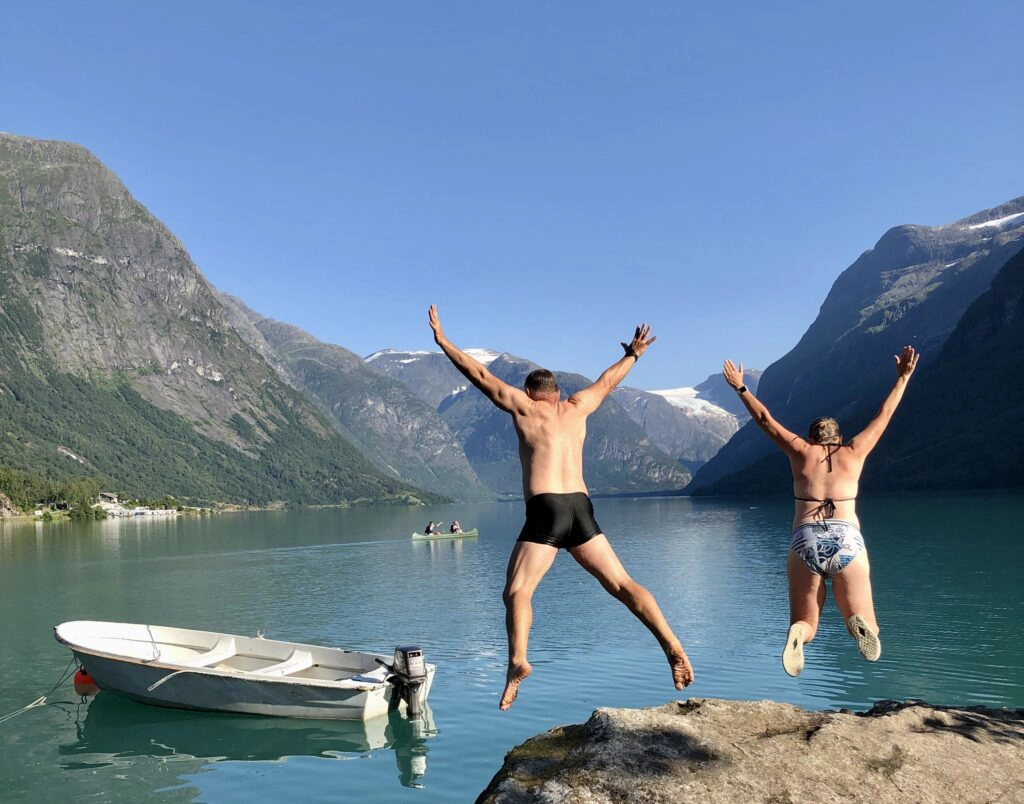
Are you looking for more tips about motorhome life? Check out these recent posts…
Buying a Motorhome That’s Right for You – All You Need to Know
Motorhome Habitation Checks – All You Need to Know
Winter in a Motorhome – Tips, Tricks & Essentials
The Best Printable Motorhome Checklists
Preventing Condensation in Your Campervan: Top Tips & Tricks
Motorhome Washing Machines – Which Is Best for You?
Love it? Pin it!
